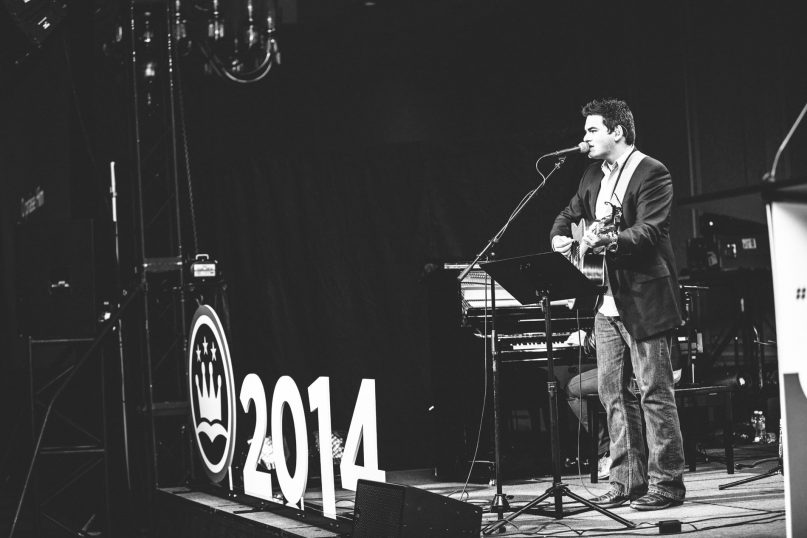(RNS) The Southern Baptist Convention’s Ethics & Religious Liberty Commission wrapped up a conference in Nashville this week outlining the denomination’s posture toward cultural changes and challenges on issues of marriage and sexuality.
In a brief, 48-hour span, dozens of speakers led 1,300 attendees and 10,000 live-stream viewers through ethical, theological and pastoral considerations of evangelical teaching on sexual ethics.
And while Southern Baptists seem to be moving past same-sex marriage as a culture war issue, they’re not moving past their opposition to homosexuality. Among the various speakers, there were certainly mixed messages.
Yet the conference was remarkable for two notable shifts: a change in tone — call it a kinder, gentler opposition to homosexuality — and a pragmatic concession that the fight over gay marriage is largely lost.
Though they do not believe civil law should recognize gay or lesbian unions as marriage, the conference acknowledged that there are many, graver threats to marriage and family life in America than same-sex marriage.
They clearly reiterated their belief that gays and lesbians must abstain from engaging in sexual expression if they seek to live as faithful Christians, yet speakers emphasized that everyone — straight and gay — experiences sexual temptation. Though sin is universal, they proclaimed that God can help all believers resist sexual activity outside of marriage.
The tone at the conference was more gracious than seen in previous generations. While stopping well short of affirmation, most speakers tried to be as conciliatory as their worldviews allow. Most deliberately avoided the crude language of figures like Duck Dynasty’s Phil Robertson. At an April summit, leaders pledged to avoid the “redneck theology” of “Adam-and-Steve” jokes. In general, that lesson seems to have sunk in. Also, there was surprisingly little talk of hellfire-and-brimstone.
Two emerging voices merit attention. Rosaria Butterfield, a former leftist lesbian professor who converted to Christianity, shared her experience and insights about the LGBT community, where she learned much about kindness and hospitality. While researching a book on the religious right, Butterfield met a pastor who helped her realize that the greatest sin in her life was unbelief, not homosexuality. Once she believed, “everything else would get worked out in the wash,” she said.
The Rev. Sam Allberry shared his experience as a gay (celibate) priest in the Church of England. Allberry embodies the view that, while lonely at times, life as a celibate gay Christian offers unique opportunities for compassion and friendship. For his witness, this Anglican cleric has won effusive praise from American neo-Calvinist evangelicals.
The ERLC Conference is noteworthy for the approach it sought to model for evangelicals and other traditionalist Christians who aim to hold the line on homosexuality. ERLC President Russell Moore spoke of “people who are gay and lesbian” — a nod to reality that few might have imagined just a few years ago — and he denounced reparative therapy as “severely counterproductive,” even as some commentators and ex-gay advocates recoiled.
The Rev. J.D. Greear, a North Carolina megachurch pastor, concluded the conference with a sermon in which he stated, “There are people whose sexual orientation God heals, like Rosaria Butterfield.” Yet he acknowledged that “the center of Christianity is not sexual ethics; the center of Christianity is the cross.”
Differences of tone and nuance notwithstanding, the message to gay Christians was clear. Either they believe same-sex erotic expression is a sin and commit to a life of celibacy, or they can give in to their impulses, thus living in willful rebellion against God.
One gay atheist observer, covering the conference for a Washington-based media watchdog organization, tweeted, “Kinda felt like we were being welcomed to a really friendly rehab clinic. But we’re not looking for treatment.”
The conference did not focus exclusively on homosexuality. Like the Vatican’s recent two-week Synod on the Family, there was teaching against cohabitation and divorce, as well as exhortations for Christians to model forbearance and permanence in marriage. Speakers explicitly appealed for churches to combat the pernicious effects of pornography and the culture’s sexualization of youth.
The ERLC’s kinder, gentler approach is not without risks. If rank-and-file evangelicals maintain family ties and friendships with gay people, they are likelier to eventually affirm them. Having already denounced reorientation therapy, criminalization of homosexuality, oppressive persecution abroad and the cruder expressions of anti-gay sentiment, some evangelicals may find that reaching a different conclusion after wrestling with a few Bible verses is not so great a leap, after all.

Jacob Lupfer is a contributing editor at Religion News Service and a doctoral candidate in political science at Georgetown University. His website is www.jacoblupfer.com. Follow him on Twitter at @jlupf. Photo courtesy of Jacob Lupfer
In the coming months, two Christian organizations will hold conferences and argue for a more inclusive and affirming approach. If other Christians do not like the SBC’s understanding of sexual ethics, perhaps they, too, should convene and live-stream conferences in which they lay out their comprehensive views of sexuality, specifying what is permitted, what is forbidden and on what authority.
You may not agree with the Southern Baptists. But at least you know where they stand.
(Jacob Lupfer is a contributing editor at Religion News Service and a doctoral candidate in political science at Georgetown University. His website is www.jacoblupfer.com. Follow him on Twitter at @jlupf.)
KRE/MG END LUPFER





